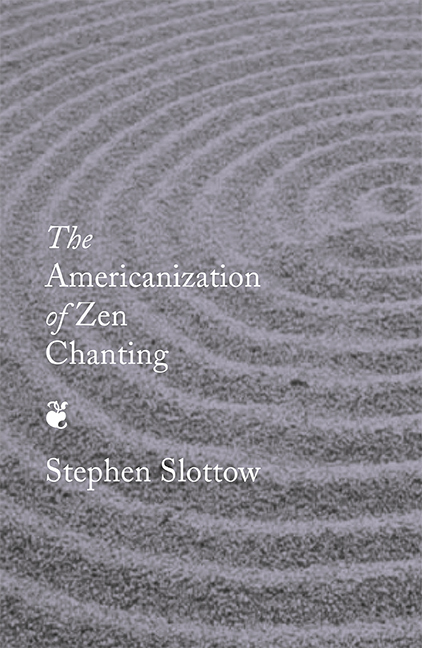Book contents
- Frontmatter
- Contents
- List of Examples
- Acknowledgements
- Chapter 1 Introduction
- Chapter 2 Purposes and Functions of Zen Chanting
- Chapter 3 Performance Practice
- Chapter 4 Typology, Translation, and Ceremonies
- Chapter 5 Conclusion
- Bibliography
- Discography and Videography
- Appendix: Alternative Chant Names
- Index
Chapter 5 - Conclusion
- Frontmatter
- Contents
- List of Examples
- Acknowledgements
- Chapter 1 Introduction
- Chapter 2 Purposes and Functions of Zen Chanting
- Chapter 3 Performance Practice
- Chapter 4 Typology, Translation, and Ceremonies
- Chapter 5 Conclusion
- Bibliography
- Discography and Videography
- Appendix: Alternative Chant Names
- Index
Summary
As a component of Zen practice, changes attendant upon the transplantation of Zen Buddhism from Japan to North America have their echo in chanting practice. There are five main changes: (1) a change of focus from monastic to lay practice, (2) greater participation of women (3) far more decentralized organizational structures—little networks, but no overarching denominational structures, (4) a de-emphasis on ritual, and (5) a de-emphasis on merit.
I will look at these in order, in the process recapitulating many points (and, in some instances, quotations) from earlier chapters.
(1) Change of focus from monastic to lay practice
It isn't entirely clear just what a North American Zen Buddhist monastery is—they don't all use the same model—but there are some. One would be Shasta Abbey and the other monasteries of the Order for Buddhist Contemplatives. Others would include Zen Mountain Monastery (founded by Daido Loori), Tassajara (San Francisco Zen Center), Dai Bosatsu (Zen Studies Center), and Korinji (Rinzai Zen Community). But, overwhelmingly, most Zen practice in America is lay. A ramification for chanting is that there is less of it—fewer daily, monthly, and annual chanting services. Without a stable population of residents and trainees, fewer people memorize the chants, or arrive at a comparable level of comfort and skill. Of course, that also depends on if and how they’ve been taught—the established policy in Japan and (somewhat less) in America is to just “catch on.” Often the explicit or implicit instruction is to match pitch or pitch class with the Ino, which tends to result in a somewhat standarized monophonic chanting common in America, (see Chapter 3)
(2) Greater participation of women
This is a major change from Japanese practice. James Ford estimates that about among American Zen teachers, roughly half are women (Ford 2018c). I don't know the percentage among Zen students, but it would be considerable. The main effect on chanting, as described in Chapter 4, is the proliferation of Matriarchal Lines (as the Village Zendo terms them) to balance what used to be called the Patriarchal Lines and are now labeled Ancestral Lines.
- Type
- Chapter
- Information
- The Americanization of Zen Chanting , pp. 133 - 138Publisher: Boydell & BrewerPrint publication year: 2018



